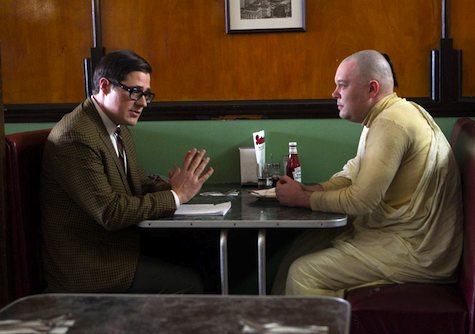The tightly-wound 1960s advertising drama Mad Men is currently portraying events in the fall and winter of 1966. And you know what this means: Star Trek!
The show made Star Trek a significant plot point in the episode from this past Sunday, “Christmas Waltz,” as Harry, the TV rep at ad agency Sterling Cooper Draper Pryce, was visited by an old colleague in the form of the formerly-bearded-pipe-smoking writer Paul Kinsey. He’s a Hare Krishna devotee now, but hoping to get his old friend Harry to pass along a spec script he’s written for the brand new Star Trek.
That spec script is called “The Negron Complex” and is about a race of white people called the Negrons and… you get the idea. Mere months on the air and Star Trek is already generating ham-fisted allegories on race, gender, etc. from writers like Paul, leaving Harry in a bind. He can’t put his own reputation behind something so obviously bad, but he also can’t let his friend down. Especially when the Hare Krishna thing is already an achingly desperate move on Paul’s part. (Although Harry does cite Star Trek’s awful time slot and unproven audience in an attempt to wheedle his way out of the conversation. Though the facts are dispiriting, it does make me gleeful that someone on the writing staff there did their research.)
In its current season, Mad Men has turned the corner into a 1966 where discrepancies in race, gender, and more are now fully on display. At the same time, the existence of such a thing as pop culture has been pervading the ongoing storylines. Tickets have been purchased for Beatles concerts, the Rolling Stones have made sex appealingly mainstream, counter-culture is dictating fashion, acid has been dropped, and people are talking about Star Trek.
This isn’t the first time this season that the show has acknowledged pop culture and the role that science fiction has in it. In an earlier episode, the stiff account executive Ken Cosgrove was revealed to be moonlighting under a pen name as a science fiction short story writer—a surprisingly successful one, with over 20 story sales under his belt—and is using this platform to mete out his observations about the changing culture. (The fact that this reveal came about during a very stifling, very 1950s-ish dinner was no accident on the part of the show writers.)
Cosgrove is ordered by the ad agency to stop moonlighting and focus on his job, but that doesn’t deter him. He switches to a different pen name and continues on. He can’t stop, the show points out. Whereas four years ago he was writing upper-class literary fare titled “Tapping a Maple on a Cold Vermont Morning,” he’s now churning out stories with titles like, “The Punishment of X-4.” Science fiction is how he truly expresses himself.
When bringing up a show like Mad Men the last thing that comes to mind is science fiction, so it’s fascinating to see a show like this addressing the beginnings of pop culture, of counter-culture, of civil rights, and acknowledging the role science fiction had in the 1960s as a mainstream tool of expression for very real issues.
I wonder how long until one of the character’s is sporting a “Frodo Lives!” button?
Chris Lough is the production manager of Tor.com and admits to immediately Googling the pen name Cosgrove uses.










